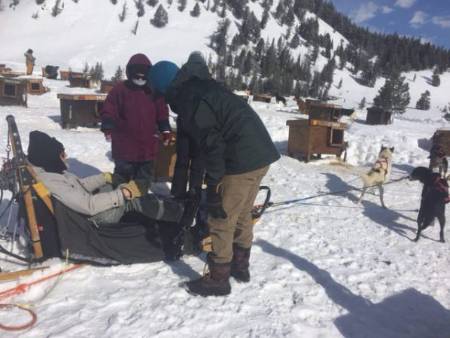Life Changing Adventure

disabilities in the Tetons. Photo courtesy of Common Ground Outdoor
Adventures, which provides many opportunities for people with disabilities.
Common Ground partners with the IDASL program.
Sherena Huntsman became a student of the IDASL class on a recommendation from her doctoral committee chair. “My dissertation is an investigation of marginalized identities in digital spaces, and that overlapped with disability studies,” she said. And that's how her graduate work in English brought her to the Interdisciplinary Disability and Service Learning class at the Center for Persons with Disabilities (SPED 6500). She is working on a PhD in Technical Communication and Rhetoric out of the English department at Utah State University—and her specialty is examining how to reach people who have trouble accessing information in the digital age. She is also a graduate instructor and assistant director of composition with the department. “The point is that technical writers are advocates for users, so they need to understand the experience for the user,” she said. She has used the IDASL class as a way to delve into the experience of people with disabilities. (IDASL is a two-semester, one- to three-credit course available to juniors, seniors and graduate students of all disciplines. Its purpose is to help people from all academic fields work together to find solutions to disability-related issues.)
For Huntsman, it has been something of an adventure, but with lessons attached. “I go bowling with them and dog sled with them,” she said. She played football with someone who uses a wheelchair. “I think that the way this impacts my teaching is understanding the student body in diverse ways, instead of putting it in a box and saying, ‘this is what a student is and does,’” she said. Huntsman lights up when she talks about it. She teaches in USU's English department, and the things she learned with IDASL are already influencing her way of teaching and thinking about her students. She pays attention to details like posting alternative text with her pictures online, and she captions her videos. She thinks all the time about how different bodies process information. But along with the fun came some apprehensive moments. When Huntsman came into the Developmental Skills Laboratory, she truly felt intimidated. “I was nervous, the first time I walked in, not knowing how to engage with people who didn’t communicate the way I did,” she said. Most of the clients at the day program for adults with developmental disabilities were nonverbal, while Sherena is a writer who tends to speak in fully-formed, grammatically-correct sentences. But she soon understood that plenty of communication was happening around her. “I just had to learn a different language,” she said. If a participant screamed or got upset or touched her, she looked for the meaning in the action. She would ask if they wanted to get up or look at a different book. She remembers putting together a puzzle with a woman who would stop moving every time she picked up the wrong piece. That was the woman’s way of telling her she was doing it wrong, she said. In addition to spending time at DSL, she put in service learning hours with the Options for Independence independent living center and Common Ground Outdoor Adventures in Logan, as well as the PEER, and Top Sports Activities and programs at the CPD. Her participation with IDASL put her in contact with people of all ages and a wide variety of disabilities. “My service learning hours have been really educational,” she said. “They’ve had far more impact than anything you can discover in a textbook.” She has a daughter on the autism spectrum, so she had some experience with disability, but as she puts it, “Disability is wide. I’d seen one tiny picture of it. … I did not realize how many assumptions that I had built up about disability identity, and how many different definitions of disability have been incorporated into the way I act and think.” But when she thinks back on the things she has done, the overall message for her is not about the differences in disability. “There’s far more same-ness between my experience as a person and other people’s. There’s less difference than I anticipated.” To find our more, or access an application for the IDASL class, visit the idasl site or contact Alma Burgess.

